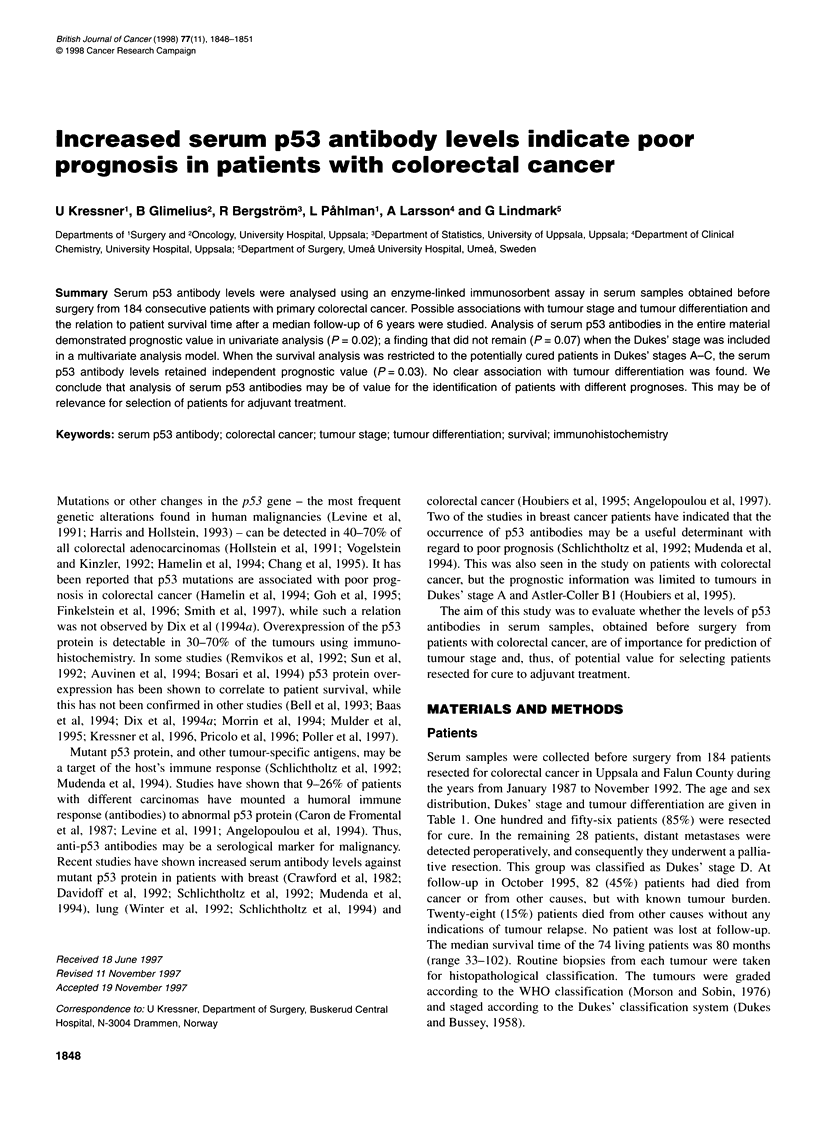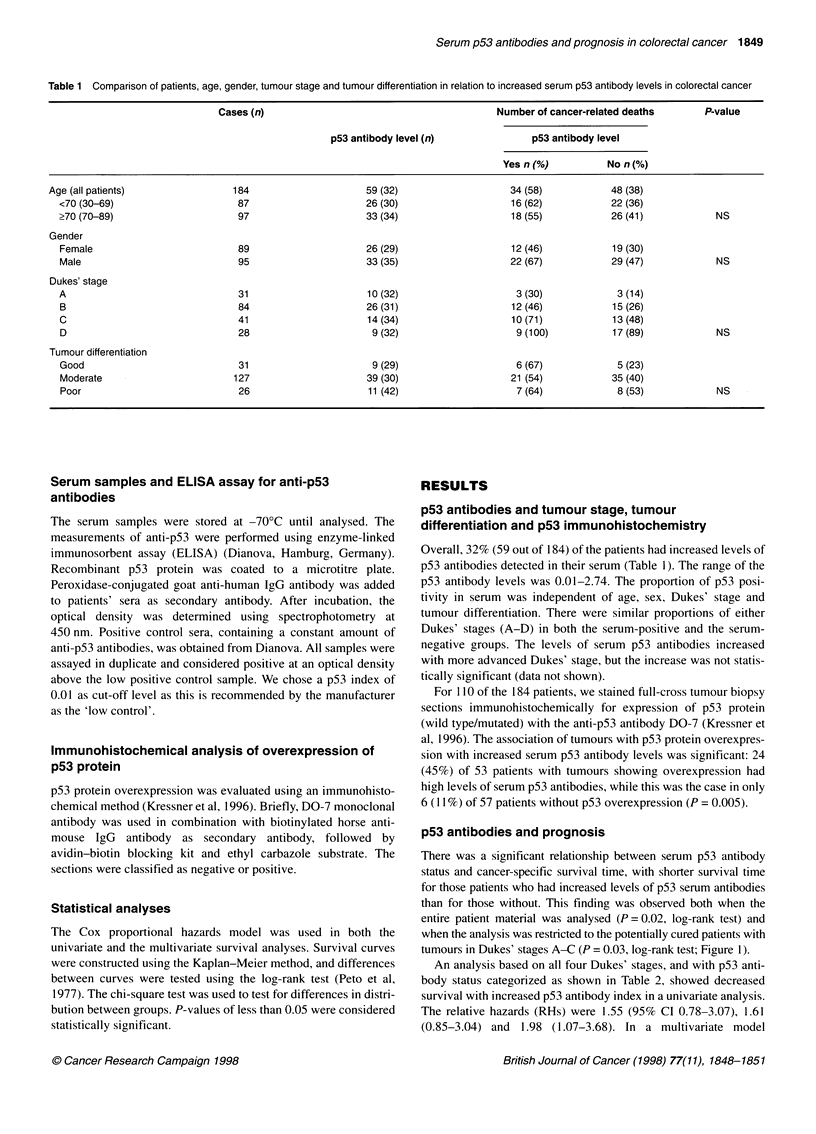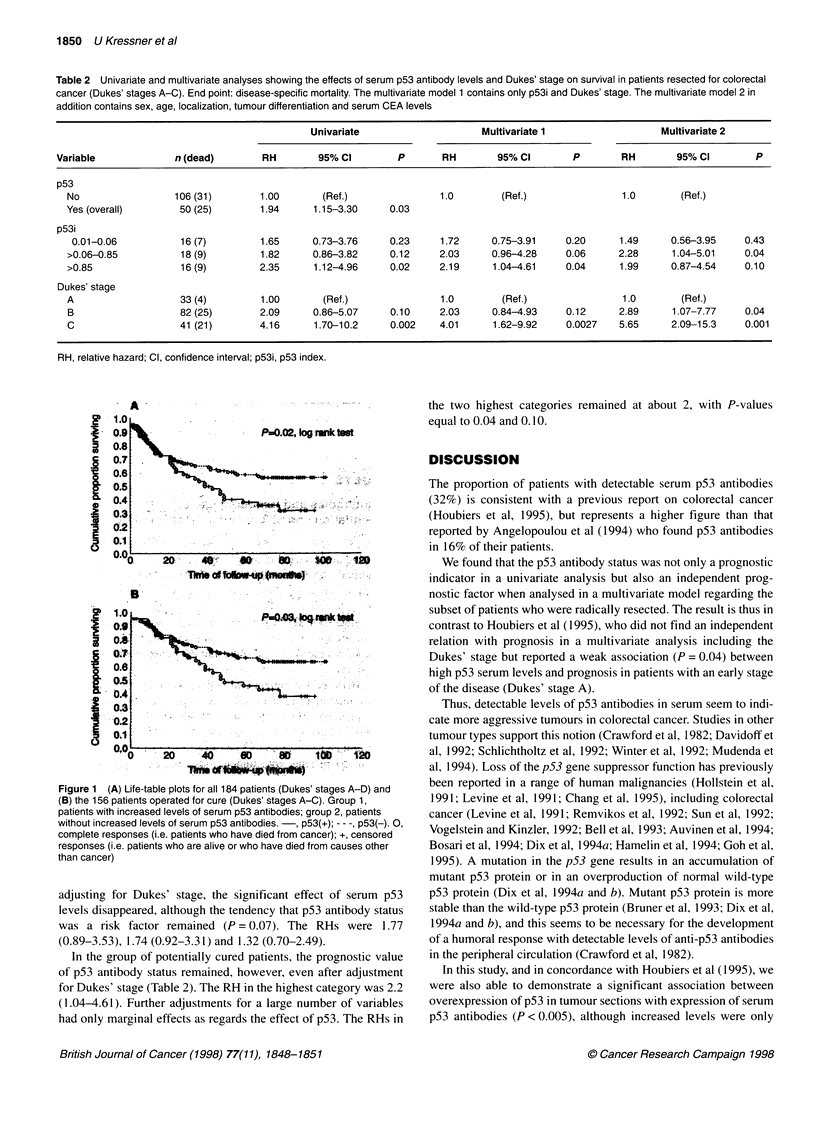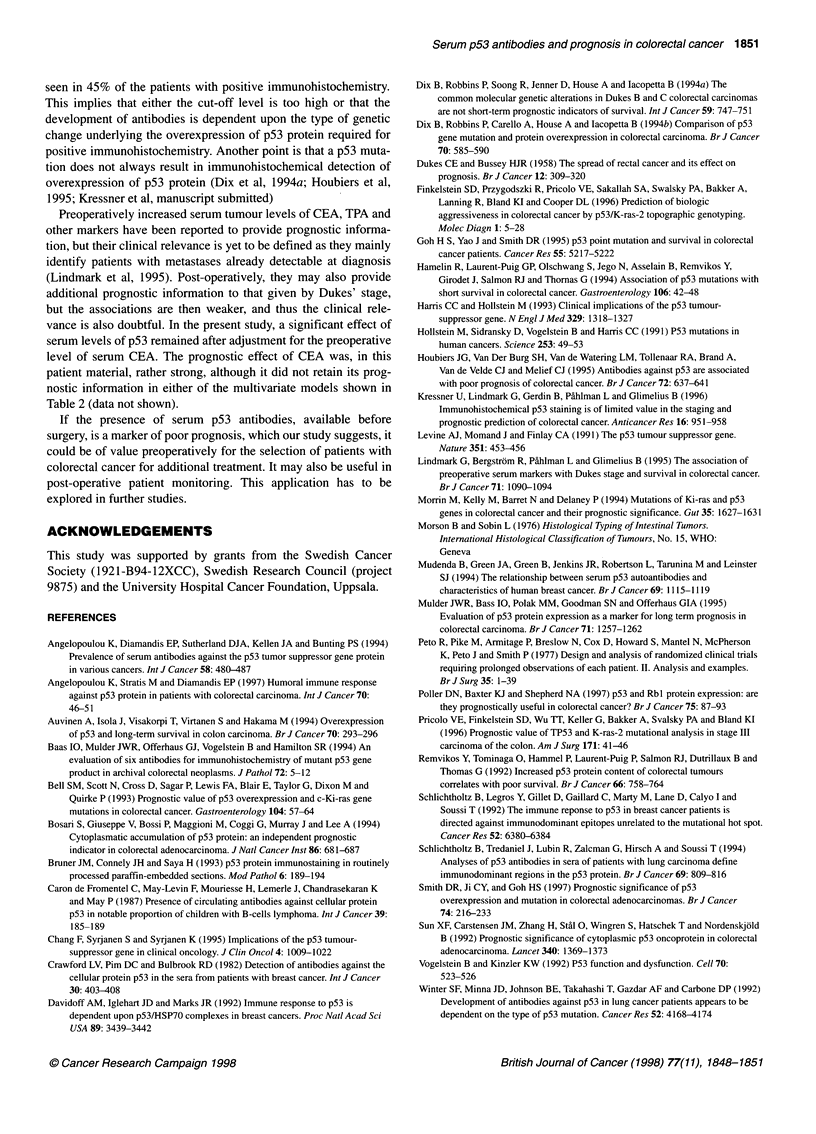Abstract
Serum p53 antibody levels were analysed using an enzyme-linked immunosorbent assay in serum samples obtained before surgery from 184 consecutive patients with primary colorectal cancer. Possible associations with tumour stage and tumour differentiation and the relation to patient survival time after a median follow-up of 6 years were studied. Analysis of serum p53 antibodies in the entire material demonstrated prognostic value in univariate analysis (P = 0.02); a finding that did not remain (P = 0.07) when the Dukes' stage was included in a multivariate analysis model. When the survival analysis was restricted to the potentially cured patients in Dukes' stages A-C, the serum p53 antibody levels retained independent prognostic value (P = 0.03). No clear association with tumour differentiation was found. We conclude that analysis of serum p53 antibodies may be of value for the identification of patients with different prognoses. This may be of relevance for selection of patients for adjuvant treatment.
Full text
PDF



Selected References
These references are in PubMed. This may not be the complete list of references from this article.
- Angelopoulou K., Diamandis E. P., Sutherland D. J., Kellen J. A., Bunting P. S. Prevalence of serum antibodies against the p53 tumor suppressor gene protein in various cancers. Int J Cancer. 1994 Aug 15;58(4):480–487. doi: 10.1002/ijc.2910580404. [DOI] [PubMed] [Google Scholar]
- Angelopoulou K., Stratis M., Diamandis E. P. Humoral immune response against p53 protein in patients with colorectal carcinoma. Int J Cancer. 1997 Jan 6;70(1):46–51. doi: 10.1002/(sici)1097-0215(19970106)70:1<46::aid-ijc7>3.0.co;2-6. [DOI] [PubMed] [Google Scholar]
- Auvinen A., Isola J., Visakorpi T., Koivula T., Virtanen S., Hakama M. Overexpression of p53 and long-term survival in colon carcinoma. Br J Cancer. 1994 Aug;70(2):293–296. doi: 10.1038/bjc.1994.295. [DOI] [PMC free article] [PubMed] [Google Scholar]
- Baas I. O., Mulder J. W., Offerhaus G. J., Vogelstein B., Hamilton S. R. An evaluation of six antibodies for immunohistochemistry of mutant p53 gene product in archival colorectal neoplasms. J Pathol. 1994 Jan;172(1):5–12. doi: 10.1002/path.1711720104. [DOI] [PubMed] [Google Scholar]
- Bell S. M., Scott N., Cross D., Sagar P., Lewis F. A., Blair G. E., Taylor G. R., Dixon M. F., Quirke P. Prognostic value of p53 overexpression and c-Ki-ras gene mutations in colorectal cancer. Gastroenterology. 1993 Jan;104(1):57–64. doi: 10.1016/0016-5085(93)90835-z. [DOI] [PubMed] [Google Scholar]
- Bosari S., Viale G., Bossi P., Maggioni M., Coggi G., Murray J. J., Lee A. K. Cytoplasmic accumulation of p53 protein: an independent prognostic indicator in colorectal adenocarcinomas. J Natl Cancer Inst. 1994 May 4;86(9):681–687. doi: 10.1093/jnci/86.9.681. [DOI] [PubMed] [Google Scholar]
- Bruner J. M., Connelly J. H., Saya H. p53 protein immunostaining in routinely processed paraffin-embedded sections. Mod Pathol. 1993 Mar;6(2):189–194. [PubMed] [Google Scholar]
- Caron de Fromentel C., May-Levin F., Mouriesse H., Lemerle J., Chandrasekaran K., May P. Presence of circulating antibodies against cellular protein p53 in a notable proportion of children with B-cell lymphoma. Int J Cancer. 1987 Feb 15;39(2):185–189. doi: 10.1002/ijc.2910390211. [DOI] [PubMed] [Google Scholar]
- Chang F., Syrjänen S., Syrjänen K. Implications of the p53 tumor-suppressor gene in clinical oncology. J Clin Oncol. 1995 Apr;13(4):1009–1022. doi: 10.1200/JCO.1995.13.4.1009. [DOI] [PubMed] [Google Scholar]
- Crawford L. V., Pim D. C., Bulbrook R. D. Detection of antibodies against the cellular protein p53 in sera from patients with breast cancer. Int J Cancer. 1982 Oct 15;30(4):403–408. doi: 10.1002/ijc.2910300404. [DOI] [PubMed] [Google Scholar]
- DUKES C. E., BUSSEY H. J. The spread of rectal cancer and its effect on prognosis. Br J Cancer. 1958 Sep;12(3):309–320. doi: 10.1038/bjc.1958.37. [DOI] [PMC free article] [PubMed] [Google Scholar]
- Davidoff A. M., Iglehart J. D., Marks J. R. Immune response to p53 is dependent upon p53/HSP70 complexes in breast cancers. Proc Natl Acad Sci U S A. 1992 Apr 15;89(8):3439–3442. doi: 10.1073/pnas.89.8.3439. [DOI] [PMC free article] [PubMed] [Google Scholar]
- Dix B. R., Robbins P., Soong R., Jenner D., House A. K., Iacopetta B. J. The common molecular genetic alterations in Dukes' B and C colorectal carcinomas are not short-term prognostic indicators of survival. Int J Cancer. 1994 Dec 15;59(6):747–751. doi: 10.1002/ijc.2910590606. [DOI] [PubMed] [Google Scholar]
- Dix B., Robbins P., Carrello S., House A., Iacopetta B. Comparison of p53 gene mutation and protein overexpression in colorectal carcinomas. Br J Cancer. 1994 Oct;70(4):585–590. doi: 10.1038/bjc.1994.355. [DOI] [PMC free article] [PubMed] [Google Scholar]
- Finkelstein SD, Przygodzki R, Pricolo VE, Sakallah SA, Swalsky PA, Bakker A, Lanning R, Bland KI, Cooper DL. Prediction of Biologic Aggressiveness in Colorectal Cancer by p53/K-ras-2 Topographic Genotyping. Mol Diagn. 1996 Jun;1(1):5–28. doi: 10.1054/MODI00100005. [DOI] [PubMed] [Google Scholar]
- Goh H. S., Yao J., Smith D. R. p53 point mutation and survival in colorectal cancer patients. Cancer Res. 1995 Nov 15;55(22):5217–5221. [PubMed] [Google Scholar]
- Hamelin R., Laurent-Puig P., Olschwang S., Jego N., Asselain B., Remvikos Y., Girodet J., Salmon R. J., Thomas G. Association of p53 mutations with short survival in colorectal cancer. Gastroenterology. 1994 Jan;106(1):42–48. doi: 10.1016/s0016-5085(94)94217-x. [DOI] [PubMed] [Google Scholar]
- Harris C. C., Hollstein M. Clinical implications of the p53 tumor-suppressor gene. N Engl J Med. 1993 Oct 28;329(18):1318–1327. doi: 10.1056/NEJM199310283291807. [DOI] [PubMed] [Google Scholar]
- Hollstein M., Sidransky D., Vogelstein B., Harris C. C. p53 mutations in human cancers. Science. 1991 Jul 5;253(5015):49–53. doi: 10.1126/science.1905840. [DOI] [PubMed] [Google Scholar]
- Houbiers J. G., van der Burg S. H., van de Watering L. M., Tollenaar R. A., Brand A., van de Velde C. J., Melief C. J. Antibodies against p53 are associated with poor prognosis of colorectal cancer. Br J Cancer. 1995 Sep;72(3):637–641. doi: 10.1038/bjc.1995.386. [DOI] [PMC free article] [PubMed] [Google Scholar]
- Kressner U., Lindmark G., Gerdin B., Påhlman L., Glimelius B. Immunohistological p53 staining is of limited value in the staging and prognostic prediction of colorectal cancer. Anticancer Res. 1996 Mar-Apr;16(2):951–957. [PubMed] [Google Scholar]
- Levine A. J., Momand J., Finlay C. A. The p53 tumour suppressor gene. Nature. 1991 Jun 6;351(6326):453–456. doi: 10.1038/351453a0. [DOI] [PubMed] [Google Scholar]
- Lindmark G., Bergström R., Påhlman L., Glimelius B. The association of preoperative serum tumour markers with Dukes' stage and survival in colorectal cancer. Br J Cancer. 1995 May;71(5):1090–1094. doi: 10.1038/bjc.1995.211. [DOI] [PMC free article] [PubMed] [Google Scholar]
- Morrin M., Kelly M., Barrett N., Delaney P. Mutations of Ki-ras and p53 genes in colorectal cancer and their prognostic significance. Gut. 1994 Nov;35(11):1627–1631. doi: 10.1136/gut.35.11.1627. [DOI] [PMC free article] [PubMed] [Google Scholar]
- Mudenda B., Green J. A., Green B., Jenkins J. R., Robertson L., Tarunina M., Leinster S. J. The relationship between serum p53 autoantibodies and characteristics of human breast cancer. Br J Cancer. 1994 Jun;69(6):1115–1119. doi: 10.1038/bjc.1994.219. [DOI] [PMC free article] [PubMed] [Google Scholar]
- Mulder J. W., Baas I. O., Polak M. M., Goodman S. N., Offerhaus G. J. Evaluation of p53 protein expression as a marker for long-term prognosis in colorectal carcinoma. Br J Cancer. 1995 Jun;71(6):1257–1262. doi: 10.1038/bjc.1995.243. [DOI] [PMC free article] [PubMed] [Google Scholar]
- Peto R., Pike M. C., Armitage P., Breslow N. E., Cox D. R., Howard S. V., Mantel N., McPherson K., Peto J., Smith P. G. Design and analysis of randomized clinical trials requiring prolonged observation of each patient. II. analysis and examples. Br J Cancer. 1977 Jan;35(1):1–39. doi: 10.1038/bjc.1977.1. [DOI] [PMC free article] [PubMed] [Google Scholar]
- Poller D. N., Baxter K. J., Shepherd N. A. p53 and Rb1 protein expression: are they prognostically useful in colorectal cancer? Br J Cancer. 1997;75(1):87–93. doi: 10.1038/bjc.1997.14. [DOI] [PMC free article] [PubMed] [Google Scholar]
- Pricolo V. E., Finkelstein S. D., Wu T. T., Keller G., Bakker A., Swalsky P. A., Bland K. I. Prognostic value of TP53 and K-ras-2 mutational analysis in stage III carcinoma of the colon. Am J Surg. 1996 Jan;171(1):41–46. doi: 10.1016/S0002-9610(99)80071-3. [DOI] [PubMed] [Google Scholar]
- Remvikos Y., Tominaga O., Hammel P., Laurent-Puig P., Salmon R. J., Dutrillaux B., Thomas G. Increased p53 protein content of colorectal tumours correlates with poor survival. Br J Cancer. 1992 Oct;66(4):758–764. doi: 10.1038/bjc.1992.352. [DOI] [PMC free article] [PubMed] [Google Scholar]
- Schlichtholz B., Legros Y., Gillet D., Gaillard C., Marty M., Lane D., Calvo F., Soussi T. The immune response to p53 in breast cancer patients is directed against immunodominant epitopes unrelated to the mutational hot spot. Cancer Res. 1992 Nov 15;52(22):6380–6384. [PubMed] [Google Scholar]
- Schlichtholz B., Trédaniel J., Lubin R., Zalcman G., Hirsch A., Soussi T. Analyses of p53 antibodies in sera of patients with lung carcinoma define immunodominant regions in the p53 protein. Br J Cancer. 1994 May;69(5):809–816. doi: 10.1038/bjc.1994.159. [DOI] [PMC free article] [PubMed] [Google Scholar]
- Smith D. R., Ji C. Y., Goh H. S. Prognostic significance of p53 overexpression and mutation in colorectal adenocarcinomas. Br J Cancer. 1996 Jul;74(2):216–223. doi: 10.1038/bjc.1996.340. [DOI] [PMC free article] [PubMed] [Google Scholar]
- Sun X. F., Carstensen J. M., Zhang H., Stål O., Wingren S., Hatschek T., Nordenskjöld B. Prognostic significance of cytoplasmic p53 oncoprotein in colorectal adenocarcinoma. Lancet. 1992 Dec 5;340(8832):1369–1373. doi: 10.1016/0140-6736(92)92558-w. [DOI] [PubMed] [Google Scholar]
- Vogelstein B., Kinzler K. W. p53 function and dysfunction. Cell. 1992 Aug 21;70(4):523–526. doi: 10.1016/0092-8674(92)90421-8. [DOI] [PubMed] [Google Scholar]
- Winter S. F., Minna J. D., Johnson B. E., Takahashi T., Gazdar A. F., Carbone D. P. Development of antibodies against p53 in lung cancer patients appears to be dependent on the type of p53 mutation. Cancer Res. 1992 Aug 1;52(15):4168–4174. [PubMed] [Google Scholar]



